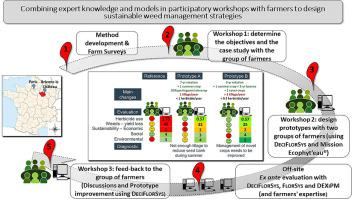Agricultural Systems ( IF 6.1 ) Pub Date : 2023-03-30 , DOI: 10.1016/j.agsy.2023.103645 Wilfried Queyrel , Bastien Van Inghelandt , Floriane Colas , Nicolas Cavan , Sylvie Granger , Bérénice Guyot , Raymond Reau , Damien Derrouch , Bruno Chauvel , Thibault Maillot , Nathalie Colbach

|
CONTEXT
In order to design cropping systems reconciling crop production, biodiversity and reduced herbicide use, we organised participatory workshops with farmers in the Champagne region (North-Eastern France).
OBJECTIVE
The main issues of the study were to develop and implement a methodology for participatory workshop-based cropping-system design, combining expert knowledge and models, in the particular case of agroecological weed management.
METHODS
Methods used in this study combined cropping-system prototyping by farmers, expert opinion and models. In a first meeting, farmers determined their objectives and constraints, and chose a reference system from one of their farms (oilseed rape/winter wheat/winter wheat/spring barley heavily infested by autumnal grass weeds). In a second meeting, two sets of prototypes were designed by two separate groups, using the Mission Ecophyt'eau® tool as support. The reference and the prototypes were evaluated in terms of (1) technical feasibility from farmers' and scientists' expertise, (2) weed harmfulness for crop production and weed contribution to biodiversity with FLORSYS which simulates crop and weed growth and reproduction in cropping systems at a daily time step over several years, and (3) economic, social and environmental sustainability with the DEXiPM model. Steps 2 and 3 were carried out after the meeting. At a third meeting, these results were presented to the farmers who continued improving the prototypes, using the DECIFLORSYS model which includes decision trees to guide farmers during cropping-system design and a fast calculator estimating weed harmfulness and biodiversity of cropping-system prototypes.
RESULTS AND CONCLUSIONS
Both prototypes presented increased crop diversification, introducing legumes and other broad-leaved crops, crop mixtures and cover crops. Both prototypes reduced weed harmfulness for crop production (yield loss, harvest contamination, field infestation) and herbicide use intensity (approx. -60%) compared to the reference system. The best solution was a suboption of prototype B replacing most of the herbicides by mechanical weeding, dividing yield loss by nearly two compared to the reference and improving biodiversity by 5–10%. The workshop participants appreciated the knowledge on agroecosystem functioning and the complementarity of models. DECIFLORSYS allowed a direct evaluation during workshops. FLORSYS produced a detailed diagnosis of the technical and meteorological causes of the cropping systems' performance. DEXiPM assessed working times and economic viability of the prototypes.
SIGNIFICANCE
Following the workshops, some participants invested in new tools for mechanical weeding and introduced more spring crops into their rotations.
中文翻译:

在与农民的参与式研讨会中结合专家知识和模型来设计可持续的杂草管理策略
语境
为了设计协调作物生产、生物多样性和减少除草剂使用的种植系统,我们与香槟地区(法国东北部)的农民组织了参与式研讨会。
客观的
该研究的主要问题是针对农业生态杂草管理的特殊情况,开发和实施基于参与式研讨会的种植系统设计方法,结合专家知识和模型。
方法
本研究中使用的方法结合了农民的种植系统原型、专家意见和模型。在第一次会议上,农民们确定了他们的目标和约束条件,并从他们的一个农场中选择了一个参考系统(油菜/冬小麦/冬小麦/秋季杂草严重侵染的春大麦)。在第二次会议中,两组原型由两个独立的小组设计,使用 Mission Ecophyt'eau® 工具作为支持。参照物和原型在以下方面进行了评估:(1) 农民和科学家专业知识的技术可行性,(2) 杂草对作物生产的危害以及杂草对生物多样性的贡献,使用 FLORSYS 模拟作物和杂草在种植系统中的生长和繁殖数年内每天的时间步长,以及 (3) 经济的,使用 DEXiPM 模型的社会和环境可持续性。步骤 2 和 3 在会后进行。在第三次会议上,这些结果被提交给继续改进原型的农民,他们使用 DECIFLORSYS 模型,其中包括在种植系统设计过程中指导农民的决策树,以及用于估算种植系统原型的杂草危害性和生物多样性的快速计算器。
结果和结论
两种原型都增加了作物多样化,引入了豆类和其他阔叶作物、作物混合物和覆盖作物。与参考系统相比,这两种原型都降低了杂草对作物生产的危害(产量损失、收获污染、田间侵扰)和除草剂使用强度(约 -60%)。最好的解决方案是原型 B 的一个子选项,用机械除草代替大部分除草剂,与参考相比,产量损失减少近两倍,生物多样性提高 5-10%。讲习班与会者赞赏有关农业生态系统功能和模型互补性的知识。DECIFLORSYS 允许在研讨会期间进行直接评估。FLORSYS 对作物系统性能的技术和气象原因进行了详细诊断。
意义
研讨会结束后,一些参与者投资了新的机械除草工具,并在他们的轮作中引入了更多的春季作物。











































 京公网安备 11010802027423号
京公网安备 11010802027423号